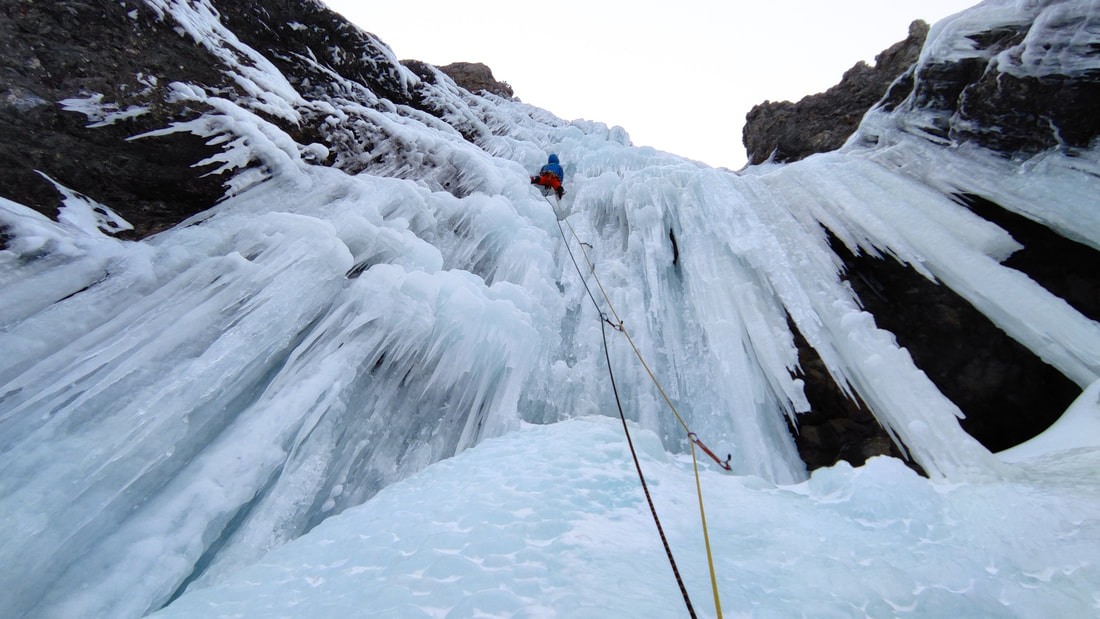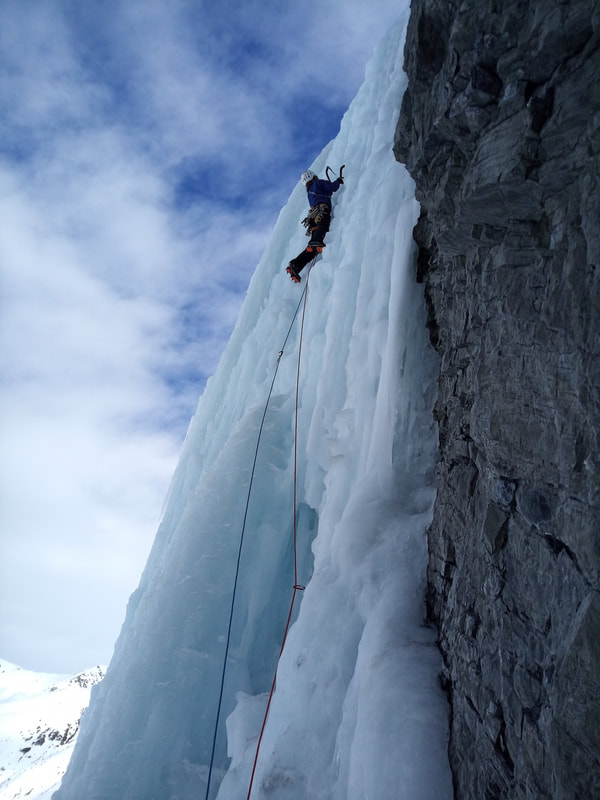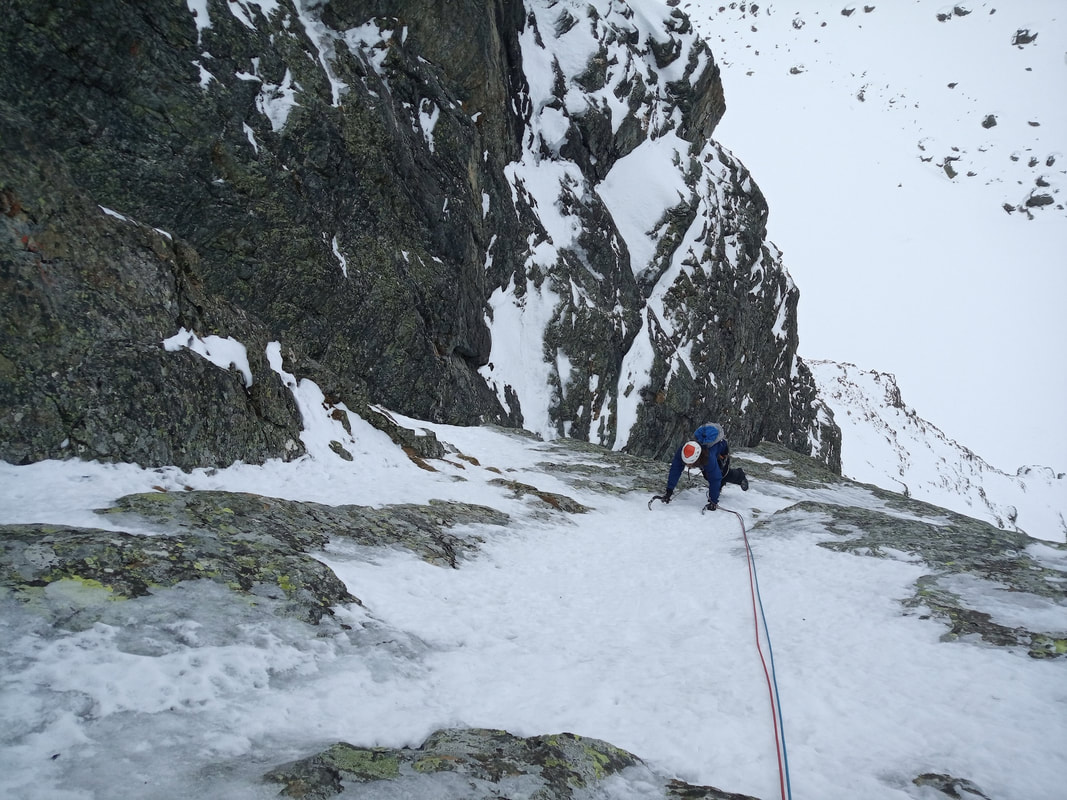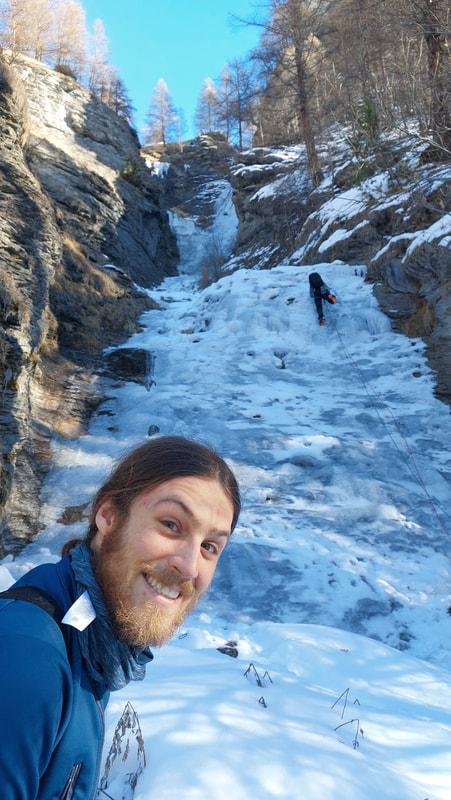Trigger Warning: The following article contains themes of mental health and suicide. If you or someone you know is struggling, there are some resources at the end of this article
I had been in institutions like this a handful of times the past two years. I knew that it had to be, but this time I wasn't feeling it. It was always the same: prior to the stay at the psych ward, I would not be able to do anything other than lay in bed and try to gain some energy - month after month. Occasionally, I managed to get out and have some fun outside in the mountains hiking and rock climbing. Often it was not enough, but it kept me going.
This time, though, the timing was off. Another few months of being in the hospital would not work, winter was coming - ice climbing season, ski touring season, mountaineering season. My favorite time of the year, with too many possibilities.
Usually when I notice I am in a bad spot and I am still in control, I get help. This time I didn't. I couldn't bring myself to get out of bed. I was fueled by the nuts, dried fruits and canned food I had at home. I could not generate any motivation for the upcoming season with its opportunities. Another reason for not seeking help were the occasionally-appearing good times, when suddenly I switched from not being able to cope to being like an energy source itself.
Although these occasions were scarce, they made me feel like I was (kind of) okay, but in a strange way. I did not sleep much; I felt a desperate need to move. Sometimes I went running two times a day (one of them in the night). I was much more social than ever, and was unstoppable. It was something like the ever-sought-after flow-state, though without any reason.
This time, though, the timing was off. Another few months of being in the hospital would not work, winter was coming - ice climbing season, ski touring season, mountaineering season. My favorite time of the year, with too many possibilities.
Usually when I notice I am in a bad spot and I am still in control, I get help. This time I didn't. I couldn't bring myself to get out of bed. I was fueled by the nuts, dried fruits and canned food I had at home. I could not generate any motivation for the upcoming season with its opportunities. Another reason for not seeking help were the occasionally-appearing good times, when suddenly I switched from not being able to cope to being like an energy source itself.
Although these occasions were scarce, they made me feel like I was (kind of) okay, but in a strange way. I did not sleep much; I felt a desperate need to move. Sometimes I went running two times a day (one of them in the night). I was much more social than ever, and was unstoppable. It was something like the ever-sought-after flow-state, though without any reason.
+++
|
|
|
I was diagnosed with bipolar disorder type 2 in the spring of 2023.
Bipolar disorder generally describes immense swings in energy, activity, and mood levels. Research shows that the brains of people with bipolar disorder are different, mostly in terms of their neurochemical balance. There are two forms of bipolar disorder (which used to be called manic-depressive). Type 1 is where the mood swings to such a high that people disconnect from reality (manic), thus having serious negative effects on their lives. Bipolar type 2 people – like me – experience their highs as less chaotic and more connected to reality (hypomanic) with less negative effects. Bipolar disorder is chronic and appears to have some genetic connections. You can liken it to someone who was born with a physical disability. Bipolar disorder is a disability that needs to be managed, which happens through medication and therapy. In therapy you are taught how to best cope with your challenges, finding your own rhythm, resources (like sports), methods, and support - not only personally, but professionally. In my case, this support includes hospital visits that are necessary to keep me alive when I’m suicidal. How long it takes to stabilize me can vary - a week to a few months. The goal is getting me back to a place where I feel I can handle life with its challenges once again. Some of the challenges that arise from bipolar condition are obvious - because they’re tethered to depressive episodes, where I have no energy for anything, a really low mood. I would not leave my room, usually not even my bed. In the darkest times, I’m even suicidal. |
While having hypomanic episodes might sound "ok," it's not, really - at least long term. It does have negative effects on your life: as an example I hurt my Achilles‘ tendon from the unappropriate amount of running I suddenly did. It is difficult not being able to influence on your own mood: knowing that you sometimes see the world as pink or dark; that sometimes you can’t trust your own memories, your own head, your own feelings. Are you really in a good mood or is your head just screwing with you once again?
If those hypomanic episodes last long, they drain energy out of your body long term, so switching into depression right after them is common. All in all, it sometimes gets pretty messy.
The first memories I have of being depressive are from my childhood. Back then I just went to school, got back home and slept, repeat. I did not really know this was wrong, as it quickly became standard, so I did not search for help. I am not able to trace the hypomanic episodes back, but they likely started some few years ago. I did not notice it, until my roommate asked me about the high amount of running and sports I did (also during nighttime and other shenanigans). Apparently I answered “I’m really good, I think I don’t need therapy any longer." I did not remember this and it was a really strange thing to say for me at that time.
That was the first step of a long and really challenging way to get officially diagnosed. It took even longer to find a medication that works for me (about a year), but now, I think I have the right one, just as I have the right support network, and the right outlook on life.
In 2023 - I spent six months in hospital, in 2022 it was four. I’m hoping to keep the duration as low as possible this coming year, as I just quit my studies for an apprenticeship, hopefully gaining structure and stability in my life.
If those hypomanic episodes last long, they drain energy out of your body long term, so switching into depression right after them is common. All in all, it sometimes gets pretty messy.
The first memories I have of being depressive are from my childhood. Back then I just went to school, got back home and slept, repeat. I did not really know this was wrong, as it quickly became standard, so I did not search for help. I am not able to trace the hypomanic episodes back, but they likely started some few years ago. I did not notice it, until my roommate asked me about the high amount of running and sports I did (also during nighttime and other shenanigans). Apparently I answered “I’m really good, I think I don’t need therapy any longer." I did not remember this and it was a really strange thing to say for me at that time.
That was the first step of a long and really challenging way to get officially diagnosed. It took even longer to find a medication that works for me (about a year), but now, I think I have the right one, just as I have the right support network, and the right outlook on life.
In 2023 - I spent six months in hospital, in 2022 it was four. I’m hoping to keep the duration as low as possible this coming year, as I just quit my studies for an apprenticeship, hopefully gaining structure and stability in my life.
+++
|
|
|
+++
So here I am again, eight weeks in. It is November and ice season is going to start soon-ish here in the alps. I’m already hoping to get out, to get back on the ice.
Ice is my favourite medium, so ephemeral but so rewarding. Ice lines seem logical and look spectacular, no matter if it is from afar or from below. The variety ice offers is other-worldly, being so dependent on conditions: the forms and shapes are vastly different - from cauliflowers to columns, from thin seams of verglas to thick and compact shields, from mushrooms to curtains to bulges. It never feels the same.
Ice is my favourite medium, so ephemeral but so rewarding. Ice lines seem logical and look spectacular, no matter if it is from afar or from below. The variety ice offers is other-worldly, being so dependent on conditions: the forms and shapes are vastly different - from cauliflowers to columns, from thin seams of verglas to thick and compact shields, from mushrooms to curtains to bulges. It never feels the same.
|
I miss the feeling of placing an ice tool and experiencing the response of the ice: the vibration of a solid stick in hero-ice to the sound of brittle ice under tension, bouncing back the tools, maybe even throwing some dinner plates at you.
I love forming this connection between the ice and those sharp crampons and ice tools. I love being able to feel and judge whether you are cool to go or it might be best to retreat or attack the feature from another position. I love having climbed enough to know these things, having the right amount of experience and being able to use it. When climbing ice, a flow-state is best, not too tense, but not too unstressed. Ice is never easy; it always demands complete engagement from the climber. The engagement - a full body immersion of the cold, the physicality, the mental game, the beauty – is my best and favourite resource for dealing with all the challenges I meet. It is when I feel most free and part of a world I sometimes feel I am not. The other element of ice climbing that is a gift is the relationships it forms. There are people that know this space, these feelings, this beauty, and the appreciation. Ice forms friendships, as you support each other on desperate pitches. These friendships are one of the most intense ones I know. These people know how engaged you are with the ice, how important this is, and how you must keep a certain state of mind for the pitch, as well as, the route. As you connect with the ice, you also connect with the people there with you. The friendships I formed while being out during wintertime or in wintery conditions are some of the strongest I know. They know the struggles I have outside of mountains, that sometimes I am not at all able to live by myself. They know when I am in hospital again. They know it hurts to not be able to go out, but they also know that it probably it is best for me at that moment, so I can get out again some time in the future. In fact, the first hospital visit was because a friend suggested I should seek immediate help. |
As I sit here in the hospital, and the cold air settles in, I know that I need to get back in shape - not physically but emotionally. I know that it must be now, so I can make more memories out on the walls with friends. I know that I need to work on some aspects of my life now, as well as in the future. But I also know, that one of the things that keeps me going is getting out with friends, who also have the spirit of mountains and walls of ice and rock inside them.
I want to be in these conditions with those who know me well, and who respect me for who I am both on the ice and beyond, that includes accepting that I have insecurities and an am not sure where I belong.
Here’s to ice and the friendships it forms - the friendships that last much better than the medium which allows and forms them.
I want to be in these conditions with those who know me well, and who respect me for who I am both on the ice and beyond, that includes accepting that I have insecurities and an am not sure where I belong.
Here’s to ice and the friendships it forms - the friendships that last much better than the medium which allows and forms them.
Mental Health Resources
GERMANY:
Call 116 117 if you or someone you know needs help. If immediate help is needed, call 112 for an emergency call. You can find information about depression on https://depressionsliga.de/ , info about bipolar disorder here: https://dgbs.de/
USA:
If someone is in immediate danger, call 911 or go to the nearest emergency room. There is a suicide and crisis lifeline available under 988. For information about the bipolar disorder you can head to https://www.dbsalliance.org, other info about how to get treatment you can find on https://www.usa.gov/mental-health.
AUSTRALIA:
If someone is in immediate danger, call 000. For help call Lifeline, 13 11 14. For info on mental health head to https://mhaustralia.org/. You can find information on bipolar disorder under https://www.bipolaraustralia.org.au/. Info on how to get help you can find under https://www.headtohealth.gov.au.
Call 116 117 if you or someone you know needs help. If immediate help is needed, call 112 for an emergency call. You can find information about depression on https://depressionsliga.de/ , info about bipolar disorder here: https://dgbs.de/
USA:
If someone is in immediate danger, call 911 or go to the nearest emergency room. There is a suicide and crisis lifeline available under 988. For information about the bipolar disorder you can head to https://www.dbsalliance.org, other info about how to get treatment you can find on https://www.usa.gov/mental-health.
AUSTRALIA:
If someone is in immediate danger, call 000. For help call Lifeline, 13 11 14. For info on mental health head to https://mhaustralia.org/. You can find information on bipolar disorder under https://www.bipolaraustralia.org.au/. Info on how to get help you can find under https://www.headtohealth.gov.au.
Author Bio
Hendrik is a person with many interests. Too many, he would probably say. Add to that an unrivaled amount of stoke and there you go. An alpinist at heart, he tries to spend as much time as he can out in the mountains doing climbs that challenge him. He writes about his alpine outings, mental health, philosophy, politics and many other things that come to his mind on his German blog, radikalvertikal.blogspot.com. If there is time, he also tries to capture some nice views along the way, which you can find on his Instagram, @radikalvertikal




